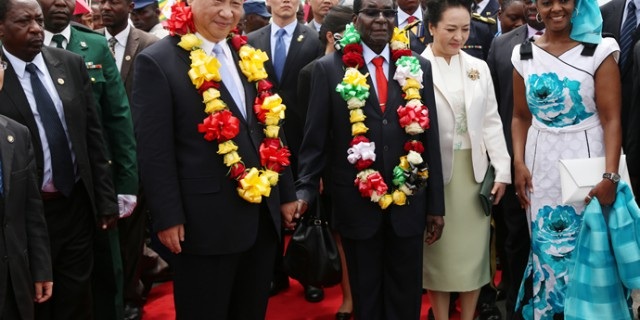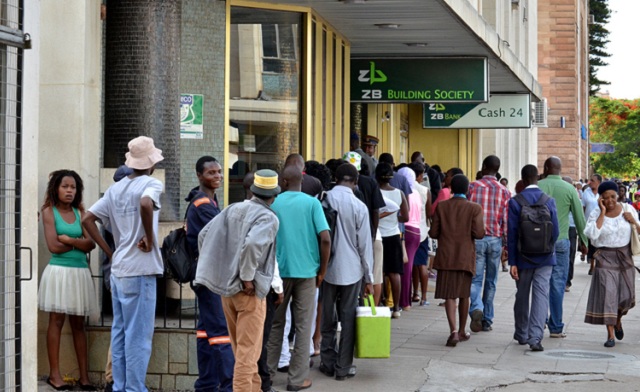‘Zim eyes $4bn energy deals on Xi’s visit’

ZIMBABWE expects to sign agreements worth about $4 billion for the upgrade and construction of four power plants with a combined electricity generation capacity of 2,400 megawatts, during Chinese President Xi Jinping’s two-day state visit, a Cabinet minister said yesterday.
President Xi, who was accompanied by his wife Peng Liyuan, touched down in Harare just after 8AM and was met by his Zimbabwean counterpart
President Robert Mugabe amid a colourful mix of Chinese and Zimbabwean pageantry.
President Xi is the second Chinese president to undertake a state visit to Zimbabwe, after Jiang Zemin’s May 1996 trip to the southern African country, which holds China as one of its foremost allies.
Finance Minister Patrick Chinamasa told reporters soon after President Xi’s arrival that the two leaders would follow up on agreements signed when President Mugabe visited China in August 2014.
“The visit of President Xi is going to consolidate and cement some of the agreements and in fact undertaking also to further co-operate with respect to those agreements, which are not yet mature for signing at this moment,” Minister Chinamasa said.
“So, as far as we’re concerned as Zimbabwe, the visit is very significant, it’s deepening, broadening our economic co-operation. We’re going to be signing Hwange 7 and 8 ($1.3 billion expansion project), which when undertaken, will add 600MW into the national grid,” Ministrer Chinamasa said.
“There are also three other power projects, which are going to be funded by the Chinese and these are private sector-driven; they’re Makomo Resources, China Sunlight and Lusulu — each of them adding 600MW to the grid. In the first half of next year we should see two of these reach financial closure.”
In July, Zimbabwe’s French-backed PER Lusulu Power signed an agreement with China State Construction Engineering Corp Ltd to build a $1.1 billion coal power station starting in April 2016, with the 600MW plant being the first phase of a 2,000MW project.
Lusulu officials have said China State Construction Engineering Corp will design and construct the plant, as well as build power lines to transmit the electricity and expects to complete the project in 2019.
Makomo Resources, Zimbabwe’s largest coal producer by output, has also laid out plans to build a $1.5 billion, 600MW thermal power plant in Hwange, to be financed by Chinese investors.
China Africa Sunlight Energy, a 50/50 joint venture between Zimbabwe’s Old Stone Investments and Shandong Taishan Sunlight of China, plans to spend $2.1 billion in the next five years on power generation, coal mining and methane bed gas extraction in Matabeleland North.
Zimbabwe’s ageing power plants have struggled to cope with increasing demand — generating just over 1,000MW against peak demand of 2,200MW and leaving households, mines and industries to endure hours of rolling power outages.
In 2018, the country expects to have an additional 300MW from the Chinese-funded expansion of its Kariba South power plant, which was built between 1956 and 1962 with an installed capacity of 750MW.
Minister Chinamasa added that road construction deals were also expected during President Xi’s state visit.
“As all of us know, we’ve had a long relationship with the People’s Republic of China, dating back to the pre-independence days, but the relationship has largely been diplomatic and political. It’s only in the past six and seven years that we’ve started an economic relationship,” the finance minister said.
“Chinese investors are becoming quite strong in terms of their investments in Zimbabwe.
“We already have more than 100 Chinese companies who have invested in Zimbabwe and there’s a lot of interest in all sectors of the economy from Chinese investors. So this visit gives a guide to Chinese investors that Zimbabwe is a safe and viable investment destination.”
China’s importance to Zimbabwe’s economy has grown over the past 10 years, with trade between the two countries doubling to $1.2 billion between 2010 and 2014.
The International Cooperation Centre — National Development Reform Commission of China’s director general Cao Wenlian on Monday told a China-Zimbabwe Business Forum that it was considering putting Zimbabwe on priority list of African countries that Beijing targets for investment, alongside Angola, Egypt, Ethiopia, Mozambique and South Africa.
There are 45 countries on the Asian giant’s investment priority list worldwide. — The Source









Comments